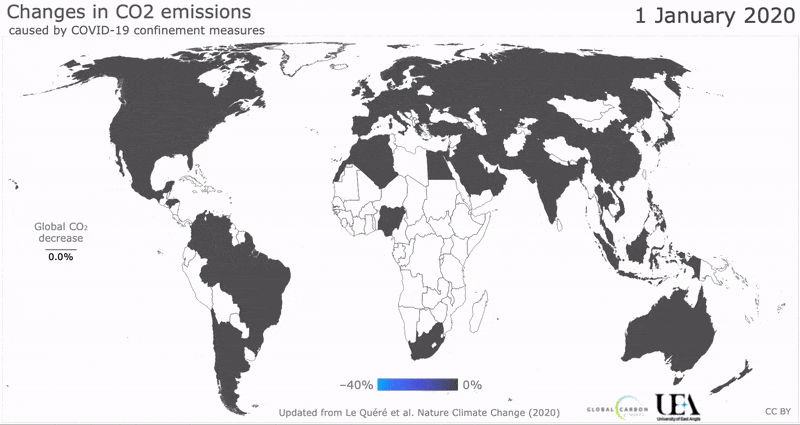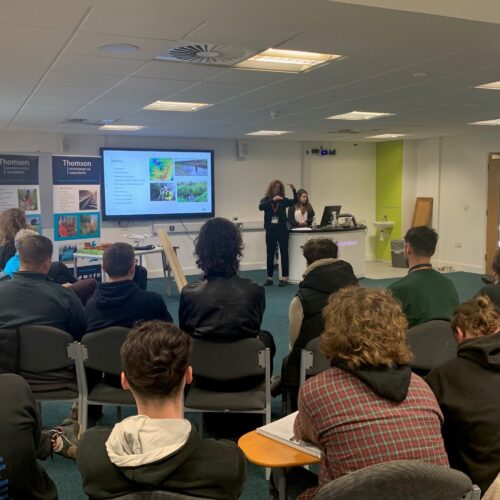“We could see long-lasting positive environmental change after the pandemic. But it’s all down to how we move forward after lockdown”.
It’s been just over a year since the Covid-19 pandemic began and March 23rd 2020 saw the beginning of national lockdown measures that few had ever seen before and most thought would not last beyond a few weeks. Twelve months on and in a third lockdown, there is light at the end of the tunnel with the astonishingly effective vaccine development and roll out programme. As the government has outlined, if all goes to plan, we will all be back to normal or near normal, whatever that is, by summer this year.
Now here’s the conundrum, there is no doubt that an end to lockdown and a positive vaccine impact is a good thing for society, and global economies in general. However, the virus impacts and resulting lockdown measures whilst crippling for people’s lives, jobs and global economies has had a significant impact on carbon emissions.
COVID-19 lockdown and reduced carbon emissions
Recent analysis indicates global carbon dioxide (CO2) emissions from fossil fuel and industry are expected to have decreased by 7% in 2020, as economies around the world feel the effects of Covid-19 lockdowns.
The carbon emission decline throughout 2020 was the largest absolute drop ever recorded and the largest relative fall since the second world war.
The latest estimates from the Global Carbon Project (GCP) suggest that total emissions for 2020 will hit 34bn tonnes of CO2 (GtCO2) this year, a fall of 2.4GtCO2 compared to 2019. This annual decline is the largest absolute drop in emissions ever recorded and the largest relative fall since the second world war.

(Source: Global Carbon Project December 2020)
The peak of the decrease in emissions in 2020 occurred in the first half of April. This was when lockdown measures in response to Covid-19 were at their most comprehensive particularly in Europe and the US, daily global fossil CO2 emissions were around 17% below average 2019 levels.
For the year 2020, researchers estimate that CO2 from fossil fuels and industry which includes emissions from burning fossil fuels, manufacturing cement and other industrial processes will decline by 2.4GtCO2 compared to 2019. This reduction has never been seen before and is equivalent to a drop of 7% in global emissions.
Dr Glen Peters, research director at the Centre for International Climate Research (CICERO) in Norway, told a press briefing: “You’d have to go back to 1945, the second world war, to see a relative drop bigger than this 7%”. The year 2020 also saw the first clear fall in global emissions since a 1.3% drop in 2009 which was driven by the global financial crisis that started in 2008.*1
Carbon emission reduction, a key consideration for UK businesses
Whilst this drop is significant and welcome, it will not be enough to slow the pace of global climate change. If we do not act now, we will lose the ability to solidify and maintain many of these reductions. There is now a clear and once in a lifetime opportunity for businesses across the UK to capitalise on this reduction, understand the areas of their business that have been hit hardest by the pandemic and the impacts this has had on their carbon footprint. The challenge now in bouncing back is to build back stronger and secure long-term emissions reductions more effectively aligned to tackling climate change.
Whilst this drop is significant and welcome, it will not be enough to slow the pace of global climate change. If we do not act now, we will lose the ability to solidify and maintain many of these reductions.
As businesses up and down the country grapple with the dilemma of how to get their teams and logistics back into full swing as quickly as possible to minimise the already catastrophic impacts to bottom lines, carbon emissions must be a key consideration. Now is the time for businesses, as part of their Covid recovery strategy, to review their workspaces and how they are used, their ways of working, revisit their carbon or net zero targets and build a new way of working, a more cost efficient and lower carbon way. There have also been significant reductions in emissions as a result of less employee commuting to and from offices, from supply chains and less paper and energy consumption in offices.
How Thomson can help UK businesses reduce carbon emissions
Thomson can support businesses with evaluating their emissions impacts though the lockdown period and advise on the ways to consolidate these reductions and to set more aspirational net zero targets as well as developing broader sustainability strategies. This could include looking at innovative ways to maintain reduced emissions due to remote lockdown working and the reductions in commuting. Coupled with new more flexible working hours and workspace utilisation there are significant savings to be made. Do employees have to be in an office every day of the working week, how productive have employees been over the lockdown period working remotely? More and more businesses are considering a move towards flexible working arrangements for their employees, this inevitably means less employee commuting and less energy used in office workspaces. However, working from home or other remote locations will also have associated carbon emissions and these also need to be assessed. We can help identify and calculate the associated impacts on carbon emissions and existing sustainability strategies.
At Thomson we recognise that it’s not enough to just ‘talk the talk’. We need to lead by example. That is why we are investing time and energy into developing our own challenging net zero strategy, driven by our staff through our Sustainability Committee. We are building on the successful achievement of internal recycling targets and the implementation of certified environmental management systems to drive down our carbon emissions and the impact of our business operations on the environment.
There has never been a greater and more exciting opportunity to deliver once in a lifetime change for the better for employees, their health and wellbeing, business bottom lines and for the environment.
If you want to learn more about what we’re doing and how we can help businesses to reduce their climate impacts, please contact: Tom Denton, Associate Director Climate Change and Sustainability. Alternatively call 01483 466 000 or email [email protected]
(Ref: Global Carbon Project December 2020)











